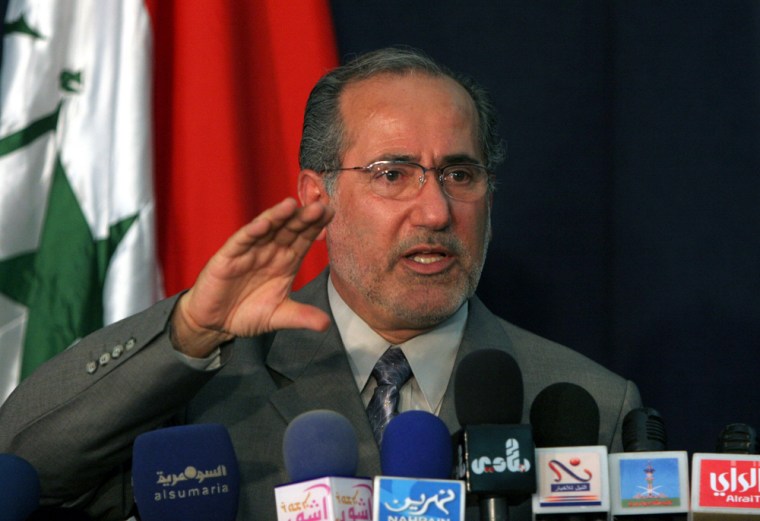Iraq's national security adviser expressed doubt Friday that Iraqi forces will be able to assume security control of the whole country by the end of the year, a goal of Prime Minister Nouri al-Maliki's government.
In April, al-Maliki said Iraqi soldiers and police would take over security responsibility from U.S. and other international forces in all 18 provinces by the end of 2007, allowing the American-led coalition to shift into a support role and possibly begin sending troops home.
"We had hopes and intentions to take over security in all provinces and command of all army divisions before the end of the year," national security adviser Mouwaffak al-Rubaie told The Associated Press. "But there are difficulties and challenges that appeared along the way, in arming, equipping, recruiting and training our armed forces."
Al-Rubaie would not give a new deadline.
"I think it is very difficult to predict a certain time," he said. "This depends on the speed of training and equipping. This depends on the level of threat whether regional or local. But we are not talking about weeks, or not even months. More than months."
U.S. military officials have been signaling for weeks that improvements in Iraqi security forces had not lived up to expectations — especially in the national police, which is widely believed to be infiltrated by Shiite militiamen.
Grim assessment?
On Friday, Maj. Gen. Rick Lynch, who commands U.S. troops south of Baghdad, said it would take until the summer of 2008 to consolidate recent gains in his area, which controls land routes into the capital from the east and south.
Last week, the chairman of the Joint Chiefs of Staff, Gen. Peter Pace, said the number of combat-ready Iraqi battalions able to fight independently has dropped from 10 to six in recent months despite an increase in U.S. training efforts.
Those grim assessments follow years of optimistic public statements from the Pentagon about the progress in Iraqi security forces and have fueled calls in the Democratic-controlled Congress to begin withdrawing from Iraq.
Lt. Gen. Raymond Odierno, the commander of day-to-day operations in Iraq, said Thursday that he would need "at least until November" to know if improvements in Iraq represent long-term trends.
But he issued a statement Friday clarifying that the statement did not change a September timeframe for top U.S. commander Gen. David Petraeus to report on progress to the U.S. Congress.
For months, Republicans in particular have regarded September as pivotal. If substantial gains could not be found by then, they say President Bush would have to rethink his military strategy, which relies on 158,000 U.S. troops.
"There is no intention to push our reporting requirement beyond September. Nothing I said yesterday should be interpreted to suggest otherwise. My reference to November was simply suggesting that as we go forward beyond September, we will gain more understanding of trends," Odierno said.
The White House also said Friday it has not changed the timetable for assessing progress in Iraq.
The U.S. has launched several offenses in and around Baghdad to try to reduce the level of violence so that Iraq's sectarian and ethnic groups could negotiate power-sharing agreements to provide for long-term stability.
Violence reduced, but continues
Although the offensives have reduced violence in the capital somewhat, progress on the political front has been slow.
Police found bullet-riddled bodies of 16 people scattered around Baghdad on Friday, apparent victims of sectarian death squads. That number was far lower than the daily tally during the height of Sunni-Shiite reprisal killings in late 2006.
Also Friday, coalition officials announced that three British troops and two American soldiers had been killed the day before in separate attacks in southern and central Iraq.
Several British soldiers also were wounded in the Thursday mortar attack by Shiite extremists on Britain's base at the airport in the southern city of Basra, the British military said. The two Americans were killed in separate attacks in the Baghdad area, the U.S. said.
The British deaths bring the number of British soldiers killed in the Iraq war to 162. The much larger American force has lost at least 3,630 service members, according to an Associated Press count.
Elsewhere, clashes erupted Friday between residents of the Shiite village of Ajemi in Khalis, 50 miles north of Baghdad, and elements of al-Qaida, leaving four people killed and three wounded, the provincial police said.
They said it appeared the village had come under attack by Sunni extremists who fled the nearby city of Baqouba, where U.S. troops are fighting to regain control from al-Qaida extremists. The police spoke on condition of anonymity because they were not authorized to disclose information.
U.S. commanders believe al-Qaida and its allows are trying to isolate Khalis, a mostly Shiite city surrounded by Sunni hinterlands.
